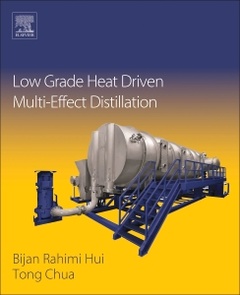Low Grade Heat Driven Multi-Effect Distillation and Desalination
Auteurs : Chua Hui Tong, Rahimi Bijan

Low Grade Heat Driven Multi-effect Distillation and Desalination describes the development of advanced multi-effect evaporation technologies that are driven by low grade sensible heat, including process waste heat in refineries, heat rejection from diesel generators or microturbines, and solar and geothermal energy. The technologies discussed can be applied to desalination in remote areas, purifying produced water in oil-and-gas industries, and to re-concentrate process liquor in refineries.
This book is ideal for researchers, engineering scientists, graduate students, and industrial practitioners working in the desalination, petrochemical, and mineral refining sectors, helping them further understand the technologies and opportunities that relate to their respective industries.
For researchers and graduate students, the core enabling ideas in the book will provide insights and open up new horizons in thermal engineering.
1. Introduction to Desalination2. Low Grade Sensible Heat-Driven Distillation3. Boosted Multi-Effect Distillation Pilot Plant4. Mathematical Simulation5. Pumping Power Analysis6. Waste Heat Performance Ratio7. Thermo-Economic Analysis8. Application of Novel Low Grade Heat-Driven Distillation to Seawater Desalination9. Application of Novel Low Grade Heat-Driven Distillation in Alumina Refineries
Researchers, engineering scientists, graduate students, and industrial practitioners working in desalination, petrochemical and mineral refining sectors
Dr. Bijan Rahimi received his Ph.D. in desalination from the School of Mechanical and Chemical Engineering of the University of Western Australia (UWA). During his Ph.D. program, he was awarded the Australian Postgraduate Award (APA), NCEDA (National Centre of Excellence in Desalination Australia) Supplementary Ph.D. Scholarship, UWA Safety Net Top-Up Scholarship and AQW (Alumina Quality Workshop) Student Scholarship. Now, he is working as a visiting assistant professor at the School of Mechanical Engineering of Sharif University of Technology (SUT). He received Iran’s National Elites Foundation Award for his work on low grade heat driven desalination and its application in Iran, in June 2016. He is working on a novel desalination pilot plant prototype at the Institute of Water and Energy (IWE) of SUT. He is also collaborating with the Water Research Institute (WRI) of Iran’s Ministry of Energy on the formulation of the first desalination research and technology roadmap for Iran. For more details you can follow him on https://www.researchgate.net/
- Focuses on advanced, yet practical, distillation technologies using low-grade sensible heat
- Explains the new design paradigm that must accompany the development of technologies
- Contains key experimental data that serves to prove the core concepts that underpin the new technologies
- Covers extensive thermo-economic analyses of the technologies, the price point for adoption, capital cost comparison with existing technologies, operating costs, and net present values
Date de parution : 03-2017
Ouvrage de 208 p.
19x23.3 cm
Thèmes de Low Grade Heat Driven Multi-Effect Distillation and... :
Mots-clés :
Alumina refinery; Bayer process; Benchmark; Boosted; Capital cost; Condensation; Desalination technologies; Desalination; Distillation; Energy consumption; Energy; Environmental impacts; Evaporation; Falling film; Flash vessel; Freshwater; Gain output ratio; GOR; Heat exchanger; Heat source; History of desalination; Liquor; MED; Mineral refinery; MSF; Multi-effect distillation (MED)Multistage flash (MSF)Net present value; Multi-effect distillation (MED)Multistage flash (MSF)Noncondensable gas; Multieffect distillation; Multi-effect distillation; Multi-effect evaporation; Multistage flash; Operating cost; Performance ratio; Performance; Pilot plant; PR; Pressure drop; Product cost; Pump; Pumping power; Seawater; Thermo-economic; Vacuum; Waste heat



